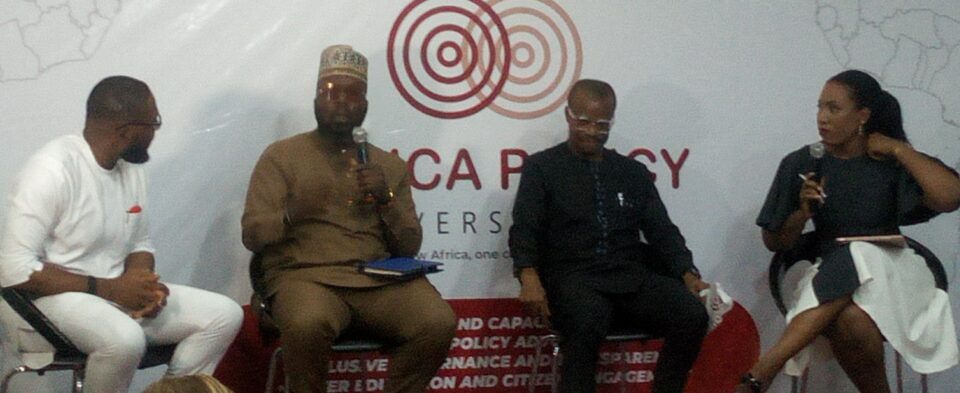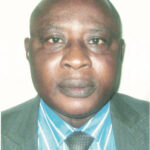Africa Policy Conversation has held its 3rd annual event to further advocate for inclusive governance and increased youth participation in governance.
Addressing newsmen in Abuja on Friday, the Co-Founder of Africa Policy Conversations, Becky Ugokwe stated that the goal of the event is “to have these conversations, gain consensus with young people, policy makers, private sector and for young people to know that their voice could be heard.”
Ugokwe said that Africa Policy Conversation holds town hall meetings in the nook and crannies of the country to ensure that the enlightenment gets to people in the rural areas, not just the urban cities
She explained that people who are in Government today will not be in power in the next 6-10 years. “The policies that they are making right now impact us so we must be involved in the conversations if we want the future that we desire.
“At Africa Policy Conversations, we engage in town hall meetings around the country and what that is supposed to do is create platforms for community conversations in the rural areas, not just Abuja, Lagos, Port Harcourt and other big cities, but some of the smaller communities. It doesn’t have to be WhatsApp, streaming or the internet. Having the conversations, gaining consensus with young people in some of these communities and getting their input and bringing back the technology outcomes to policy makers in the the Federal level,” she said
She urged young people to do more in participating in politics, adding that “nothing is given to you, you have to take it so if we do want to see ourselves in these positions and make the changes then we have to keep pushing; joining a political party, joining grassroot groups in your LGAs, states, and the Federal Level, run for elections as well.
“We already know of the ‘not too young to run’, there are Organisations funding people to run for positions.”
Also Speaking, Director, Public Policy Initiative, Shehu Musa Yar’Adua Foundation, Amara Nwankpa, said that certain changes are gradual and not radical, hence the need to keep pushing with the hope to achieve the desired changes .
He further said that It is in everybody’s interest to consider the inclusion of stakeholders in conversations of governance that impact them because “you can’t shave someone’s head in their absence.”
“It’s important that people who have a role to play or people who are impacted by policy should have a role in crafting it and should make input into the process to ensure that there is agreement and consensus around the policy because their actions can make or break the success of the policies that we are talking about. Inclusion he said, is about who; whose voices haven’t we heard? Who are the marginalised voices?
“If it is a policy about education are we listening to parents, are we listening to young women, are we listening to a certain demographic of people, for instance: in terms of income group who may not have access to the medium through which we are doing consultations. If we are doing consultation on social media, what about the people who do not have access to the Internet? If we are doing consultations on WhatsApp, what about people who do not have mobile phones?
“Inclusion is about thinking about stakeholders who might be impacted by policy but might not be able to influence it because of access or marginalisation or the fact that they are traditionally excluded from these conversations
The Executive Director of ACE Centre and convener of WEVOTE, Obinna Osisiogu stated that youths have everything it takes to takeover government.
He however noted that the problem is that “we are struggling to find a space to contribute to governance initiatives. You look at things like high cos of running for office as part of the barriers that hinder young people from joining the political space.
“What young people need to know is that they can start small.
“There is no reason why a young person should not be the chairman of a party ward because it is a very sensitive position, there is no reason why an old man should be youth leader,” he added.
He further urged young Nigerians to disbelieve the lie that votes do not count, explaining that the choice of who to vote and which political party to vote for lies on eligible voters to decide.
“There are certain lies we have come to believe over the years that have informed the basic notion of what is real and what is possible for us.
“One of the lies he said, is that ‘our votes do not count’, two is the lie that ‘we have to choose between the devil and the deep blue sea’, between party A and party B”, he said.
He added that no President in Nigeria has won an election with more than 16 million votes, adding that the voting age population as at 2019 was 106.4 million. “There are so many parties. If even half of the people who didn’t vote, come out to vote for any of these parties you will see that we have more options, it should not be choosing between party A and Party B, we have options.”
“One of the things I appreciate about young people, especially the post EndSARS, is the increased civic consciousness; the fact that we are having this conversation is really important. The youths in Nigeria are in a space in time when we are trying to find our voice, we are trying to find that voice we had a glimpse of during the EndSARS. For some people it’s going to be through voting, for some, it is going to be through events like this and for others, it is going to be through criticising the Government.”



